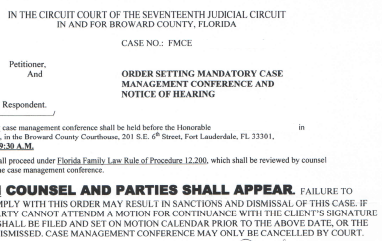Q&A: Notice of Case Management Conference

Q: I received a “Notice of Case Management Conference” in my divorce case in the mail today. What does that mean?
A: If you have received a Notice of Case Management Conference in the mail, it usually means that your case is moving forward in some way. A “Case Management Conference” is a status hearing the Court holds to assess where your case is and what the Court can do to move it forward. Sometimes, the Court sets trial dates, orders mediation (settlement conferences), enforces discovery deadlines, and more. An experienced family law attorney can guide you through the Case Management Conference to make sure your case is headed on the right track.
Q: What if I haven’t hired a divorce attorney or filed any papers yet?
A: Sometimes, a divorcing spouse may feel overwhelmed or upset and choose to ignore divorce proceedings. However, what many people do not understand is that if you do not participate in your divorce proceedings, decisions will be made without you, and often times it is what the other spouse asked for. It is very important to assess your situation with an experienced family law attorney to determine if any deadlines have been missed, and what steps can be taken to put your case in the best position possible.
Q: What should I do if I get a Notice of Case Management Conference?
A: If you received a Notice of Case Management Conference, you should contact an experienced family lawyer to make sure your case is headed in the right direction and your rights are protected. After a thorough evaluation of your circumstances, an experienced divorce attorney can help you figure out if you need to file or supplement any documents, prepare for the “Case Management Conference” and work on a strategy to meet your goals.
Contact us today to speak with an attorney about your divorce or family law case.
This is NOT LEGAL ADVICE. It is intended for informational purposes only and should not be relied on to make any legal or other major decisions. If you have specific questions or inquiries regarding any of this information, you should consult with an attorney licensed in your state.

